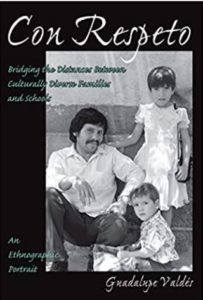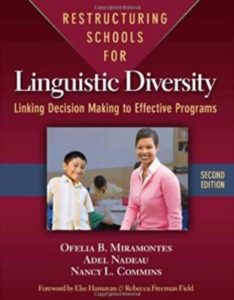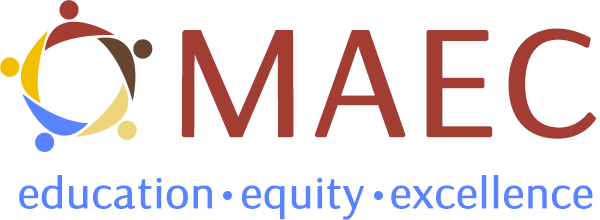Staff Book Recommendations: Charo Basterra

 There are three books that develop my conceptual framework within educational equity work. The first one is Con Respeto by Guadalupe Valdes (“Con Respeto” means “With Respect” in Spanish). This book, published in 1996, discusses how to address Latino families from various backgrounds. It talks about how to communicate with Latinx parents and establish a conceptual framework regarding addresses cultural responsiveness, emphasizing that we need to think about cultures and languages as assets.
There are three books that develop my conceptual framework within educational equity work. The first one is Con Respeto by Guadalupe Valdes (“Con Respeto” means “With Respect” in Spanish). This book, published in 1996, discusses how to address Latino families from various backgrounds. It talks about how to communicate with Latinx parents and establish a conceptual framework regarding addresses cultural responsiveness, emphasizing that we need to think about cultures and languages as assets.
The second book that had a deep impact on me is Restructuring Schools for Linguistic Diversity by Ofelia B. Miramontes, Nancy L. Commins, and  Adel Nadeau. This was one of the earliest books that showed principals addresses the importance of teaching English Learner students using an structural approach. It resonated with me because of the way it described how to organize and restructure schools to ensure that English Learners have their needs addressed. For me, Restructuring Schools for Linguistic Diversity illuminated a structural way of thinking when considering system change; we can’t just change a little thing here and a little thing there. It is vital to make systematic and comprehensive changes in order to have a positive impact in the academic achievement and socio-emotional areas of this diverse population, particularly that have a methodology and a way of structuring the way we address the diversity population, in this case English Learners.
Adel Nadeau. This was one of the earliest books that showed principals addresses the importance of teaching English Learner students using an structural approach. It resonated with me because of the way it described how to organize and restructure schools to ensure that English Learners have their needs addressed. For me, Restructuring Schools for Linguistic Diversity illuminated a structural way of thinking when considering system change; we can’t just change a little thing here and a little thing there. It is vital to make systematic and comprehensive changes in order to have a positive impact in the academic achievement and socio-emotional areas of this diverse population, particularly that have a methodology and a way of structuring the way we address the diversity population, in this case English Learners.
 The third book on my list is The Mirror of Language by by Kenji Hakuta, a professor at Stanford University. He talks about bilingualism and the importance of understanding the impact bilingualism has on cognition and ways of thinking and why it matters. The Mirror of Language looks at the value of learning multiple languages and fosters efforts toward emphasizing the positive impact of bilingualism through policy, practices, and financial support. One of the most interesting findings discussed in this book is that to have cognitive flexibility and benefits of bilingualism, you have to be fluent. It is not enough to know a little bit of the language
The third book on my list is The Mirror of Language by by Kenji Hakuta, a professor at Stanford University. He talks about bilingualism and the importance of understanding the impact bilingualism has on cognition and ways of thinking and why it matters. The Mirror of Language looks at the value of learning multiple languages and fosters efforts toward emphasizing the positive impact of bilingualism through policy, practices, and financial support. One of the most interesting findings discussed in this book is that to have cognitive flexibility and benefits of bilingualism, you have to be fluent. It is not enough to know a little bit of the language
Each of these books explores different components: cultural diversity, systemic change in terms of linguistic diversity, and the research behind bilingualism. The intersection of the three creates the conceptual framework for the work I have done, intend to do, and continue to do at MAEC.

